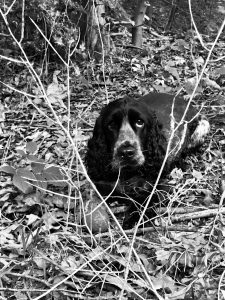
I know my dog, Riley, has taught me many things over the years, so I thought it would be interesting to write a blog looking at typical canine behaviour and what it can teach us if we want to be successful leaders.
Observation of your dog can provide a greater understanding of successful leadership because leading and coaching people is pretty much the same as dog training. Really, it is!
As Cesar Millan, the well-known dog training guru says, the vital thing to understand is the importance of intention, energy and impact.
If you haven’t come across Cesar Millan before, he is known as the Dog Whisperer and has a TV show, as well as many training videos and books.
The basic premise of the show is this – Cesar gets a call from an owner who can’t handle their dog, he observes the dog’s behaviour and then coaches the owner to get the best out of their pet by understanding how the dog thinks and reacts, working with the owner to establish them as a pack leader and set boundaries.
A bit like a leadership coaching session isn’t it?
Now, I’m not suggesting that you should treat your team like a pack of dogs, or that you should adopt the alpha male position in the office.
However, adapting what you observe about general behaviour – action and reaction – will enable you to make positive changes and refine your leadership skills.
Here are some of the basic principles Riley has taught me:
Be Clear on Your Intentions
Clear goals are critical – and a good leader communicates them well to their team.
The pack leader will communicate to their team what they want them to do and the pack automatically follows, as it understands the authority of the leader and believes in them.
Think about how precise your communications are. Does your team know where the company is heading? Do they understand how you will get there and what part they will play?
A team that understands the end goals is more likely to bond as a cohesive group, working together to achieve the same aims.

Be Calm and Assertive
Cesar Millan says, “To establish yourself as the pack leader, you must always project calm, assertive energy. This natural balance nurtures stability and creates a balanced, centred and happy dog.”
He adds, “Animals don’t follow unstable leaders. Only humans have leaders who lie and get away with it.”
Managing your emotions in the workplace is pivotal in establishing a productive and happy team.
Attitudes and behaviours are contagious, in a positive or negative way. The energy we exude is what and who we are. It is constant non-verbal communication to others in your team and affects how they react to you. So, if you want your team to respond enthusiastically and follow you, you need to be sure your energy is positive, calm, balanced and assertive.
If Riley does something wrong, my initial reaction is to correct it, but if she doesn’t listen, I can find myself raising my voice and getting angry. This generally serves to agitate her and doesn’t go any way to solving the problem.
Say, for example, a team member has made a mistake in their work; it’s critical that you deal with it calmly, looking at how the problem can be addressed and enabling the individual to learn from the mistake and move forward.
No-one wants to work for a manager likely to lose it over a mistake. That sends a message of constant fear through a team and will undoubtedly affect their productivity in a negative way.
Remember that others react to your energy, so aim for positive energy, and you will see it reflected in your team’s behaviour.
 Be Prepared to Get Muddy
Be Prepared to Get Muddy
Life’s all about jumping in the water, or mud in Riley’s case. Dogs don’t put the brakes on, concerned that the water may be deep, or the bog particularly filthy. They just get on with it.
The morale of this lesson is to never hold back. To succeed as a business professional, you need to be prepared to jump in and take risks. Bold goals need bold moves.
So, be prepared to get your hands dirty. Be accountable for what you do. Yes, there will be rough patches, but the key is to learn from them and move on.
Recognise Where Your Weaknesses Lie
Leo Tolstoy said, “Everyone thinks of changing the world, but no one thinks of changing themselves”. In other words, you need to be prepared to change yourself before you change others. You can’t expect them to do what you don’t.
Riley doesn’t dwell on her mistakes; she learns that the stick is too big to manoeuvre through the door and moves on to a smaller one. She acknowledges she was wrong and takes measures to improve next time.
If you show by example that mistakes can be recognised and provide learning curves, your team will be more likely to shine when things are going well.
Enjoy the Little Things
Dogs focus on the here and now, appreciating everything that happens (a car ride…my favourite thing. Chicken…my favourite thing. You’re home…my favourite thing. You get the picture).
What we can learn from this ability to live in the moment is that it’s not just about the big goals in our professional life. Sometimes we can be so focused on the endgame that we forget to celebrate the here and now.
Striving for a distant achievement can deplete your energy reserves and make you despondent if it feels as though you’re not getting there fast enough, or suffering setbacks.
It’s important to celebrate the little wins along the way. So, make those milestone achievements, however small, count them with your team; it will energise you to achieve great things!
Good Leadership Equals Respect
Great leaders, canine or human, have their pack’s respect.
Appreciating your employees and enabling them to identify strengths to achieve their personal goals will earn you respect as a leader.
You will be judged by your values and actions. So, let your principles guide your actions and provide a template for others. If you are true to your beliefs, you will empower your team and provide inspirational leadership to boost your company’s success.
And, on a final note, don’t forget to jump in the water now and then …just for the fun of it.
Thanks,
Rachel Hewitt-Hall
Managing Director
About Excel Communications
Excel Communications has a 30+ year history as a global leadership and communication skills company providing training and development to organisations across the globe, view our case studies here.
We have a team of expert trainers delivering programmes across four continents in multiple languages. Call us now on +44 (0) 1628 488 854.
Important
If you would like to watch our leadership masterclass recordings, you can access them here latest complimentary guide here.
